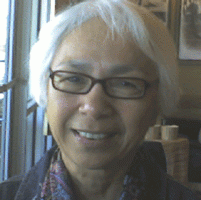Violet Lui-Frank

Women Lawyers ~ Women Leaders Arch Violet Lui-Frank was born July 10, 1943 in Honolulu Hawaii to Helen Stone and Raymond K. Pae Lui. At the time of her birth the family lived in Palolo Valley on the island of O'ahu. The maternal side of her family is from the Polulu Valley in the Kohala District of the island of Hawai'i a remote valley that is no longer inhabited due to an earthquake that destroyed the only road to the area. Judge Lui-Frank's Native Hawaiian heritage has been an important influence in her legal career which has been almost completely with Native American people and tribes. In 1961 Lui-Frank graduated from high school and chose to attend a small liberal arts school in Pennsylvania Alleghany College. She remembers her experience there as a mostly positive education in mainland Midwestern culture. After two years at Allegheny College Lui-Frank returned to Hawaii and graduated from the University of Hawaii in 1965. In 1975 after two years of graduate school at the University of Hawaii and several years working full time Lui-Frank was admitted to Boalt Hall School of Law at the University of California - Berkeley. The decision to attend law school grew out of her work on Native Hawaiian rights and sovereignty issues. She recalls law school as a wonderful experience in which she fell in love not only with the beauty of northern California but also with the law itself. Being a Native Hawaiian with an Indian background and having seen Indian law-related issues play out in her native Hawaii Lui-Frank had an interest in Indian Law. So in the summer following her second year she took an ill-paying but immensely satisfying law clerk position with DNA-People's Legal Services on the White Mountain Apache Indian Reservation in northern Arizona. The Bureau of Indian Affairs provided the DNA program law clerk with an apartment but perhaps the greatest benefit of the job was meeting an incredible mentor David P. Frank. This mentor was Lui-Frank's supervising attorney a brilliant man who was to later become her husband a man to whom she is still happily married today. At the end of the summer Lui-Frank returned to Boalt Hall to complete the final year of her legal education. Upon graduation in 1978 she took a position with DNA-People's Legal Services returning to the White Mountain Apache Indian Reservation. She was admitted to the State Bar of Arizona in 1979. In 1981 Lui-Frank and her husband moved to Anchorage Alaska. She was hired as a clerk in a medium-sized firm in Anchorage while she studied for and passed the bar in 1982. In 1983 Lui-Frank returned to the Southwest and DNA-People's Legal Services this time taking a position in Farmington New Mexico. She was admitted to the State Bar of New Mexico in 1983. When Lui-Frank returned to her position at DNA-People's Legal Services she found a myriad of opportunities to both serve her indigent clients and learn from them as well. She also found that people are resilient and often find ways to cope in spite of the adverse effects of their choices and experiences involving the law. Lui-Frank learned that a lawyer must strive to provide the best legal services for the client but must also learn not to carry the full weight of a client's burden and to have what she terms respectful boundaries for your caring. This means respecting that your client has choices and bears responsibility for his/her life. The lawyer can never guarantee a result for a client but must work for the best result as identified by the client with the benefit of the lawyer's advice. After moving to Tucson in 1990 Lui-Frank eventually became a judge for the Pascua Yaqui Tribe of Arizona serving as their Chief Judge for five years. She also served two years as Chief Judge for the San Carlos Apache Tribe. In 2001 Lui-Frank was appointed to the bench in the Tohono O'odham Judicial Court and completed a six-year term as a judge retiring in 2007. Lui-Frank was one of 100 Women and Minority Lawyers honored for their contributions to the legal profession by the State Bar of Arizona. She also takes pride in having been the first non-Navajo elected as president of the Navajo Bar Association. However what Lui-Frank found most memorable were not the public accolades but the opportunities in which she was able to teach and share with the people with whom she worked and others her knowledge about the law - most importantly that it is a dynamic vital evolving area of human knowledge and experience. What we take as settled for a period of time may change as our experience knowledge and understanding of our society our history and our relationships with other nations and cultures change. Our challenge is to balance the need for appropriate change in our laws with the very human desire for stability and predictability without abandoning our country's principles of individual rights equal protection of the law and due process. Our challenge is to be willing to revisit the balance we believe we have achieved when new legal questions arise in our society. The legal profession has had and will continue to be a key part of meeting this challenge. Lui-Frank currently resides in Three Points Arizona with her husband and despite retirement continues to serve as judge pro tem for the Tohono O'Odham Nation and as an associate Justice of the Fort McDowell Yavapai Nation. Although she may not reside in Tucson she does make it to the area often and you just might be lucky enough to catch her at her favorite dining establishment Lani's Luau on Harrison and Golf Links. Make sure you stop for a chat because the warmth of her personality and strength of her spirit come across even to those who have known her only a short time. It will be an experience you are not soon to forget.


